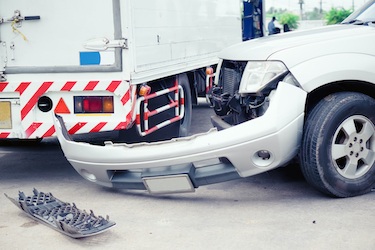
Pursuing a personal injury claim for compensation following a car accident can be complicated, especially one involving a company vehicle. If you were hit by a company vehicle, contact an attorney right away to receive legal advice.
A company vehicle is any vehicle owned by a business and driven by an employee or other “agent” of the business. The vehicle could transport equipment or goods or be an employee’s assigned company car. Understandably, prospective clients come to us to find out, “What should I do if I was hit by a company vehicle?”
If you suffered injuries due to another driver’s negligence, don’t hesitate to contact the Beliz Law Firm. We can help you determine the best course of legal action when a negligent driver in a company vehicle causes an accident.
Injured by a Company Vehicle? Understand Your Rights and Maximize Your Claim – Reach Out to Beliz Law Firm for a Free Consultation!
What To Do Immediately Following an Accident with a Company Car
The steps you take immediately following an accident can impact your injury claim later. Here are some helpful things to remember following an accident with a company-owned vehicle in California.
Contact the Police
It’s crucial to contact the police following an accident with injuries, especially when a company vehicle is involved. In a traffic collision report, it usually states the driver’s name and the owner’s name. An officer may determine that the vehicle being driven was a company vehicle.
In addition, the report will state the insurance information like company and policy number. This insurance information may also lead to the finding of the vehicle and/or the insurance being with a company.
Exchange Contact Information
Be sure to exchange all information with the other driver. Exchanging information will get you details on insurance and the owner of the vehicle. The insurance information will lead to the value of the policy limits. If the other driver was in the course and scope of employment and driving under their employer’s insurance plan, the policy limits may be higher. Most company insurance is higher than the average personal auto insurance limits.
Further, remember to gather information on independent witnesses. Witnesses are essential in these collisions because the insurance adjuster will strongly argue that the company representative was not at fault.
Take Scene Photos
If you can do so safely and not further injure yourself, take photos of the damage and surrounding scene. You don’t need a professional camera; cell phone images are fine. Try to get pictures of all vehicle damage, debris on the ground, skid marks, or any element of the scene that might be important to your claim.
Most importantly take photos of the other vehicles. There may be a decal that shows it was a company vehicle. Don’t forget other factors like weather conditions, road hazards, a broken or blocked traffic sign, or any other relevant detail.
Seek Medical Treatment Right Away
If you do not require emergency medical transport from the scene, you still need to seek medical treatment right away. Even if you do not think you are severely injured, it’s crucial to get checked out. You could have internal injuries or soft tissue injuries that are not visible. If you delay treatment, the defendant’s representatives will likely use that fact to say that you weren’t that injured. Or they might suggest that another intervening event—that happened after the crash but before seeking treatment—caused your injuries.
Contact an Attorney
The other driver’s insurance will try to dissuade you, but it’s best to hire a lawyer right away. The sooner you have legal representation, the more your rights are protected. Having a legal advocate from the start will allow your attorney to do your talking for you, thereby keeping you from saying something that could harm your case.
Examples of Accidents Involving Company Vehicles in California
1. Delivery Driver Runs a Red Light
A delivery driver for a major shipping company runs a red light while making a scheduled delivery, striking your vehicle. If the driver was on duty, the employer is likely liable under vicarious liability.
2. Rideshare Vehicle Causes an Accident
A rideshare driver carrying passengers rear-ends you while working. The rideshare company’s commercial insurance policy may apply if the driver was actively engaged in transporting or picking up a passenger.
3. Company Car Used for Work Errands
An employee driving a company car to a client meeting sideswipes your vehicle. Since the driver was performing work duties, their employer’s insurance is typically responsible for damages.
4. Commercial Vehicle Overloaded with Cargo
A commercial truck overloaded with cargo causes a crash because the weight made the vehicle harder to control. Both the trucking company and the driver may be held liable for negligence.
5. Personal Use During Work Hours
An employee runs a personal errand in a company car during work hours and causes an accident. In this case, liability may depend on whether the errand was a minor deviation from work duties or a complete departure.
Determining Liability if a Company Car Hits You in California
California follows the rule of pure comparative negligence. This means that you can still collect compensation if you share fault for the accident. However, your award or settlement will be reduced by your percentage of fault. So someone who is 20% liable would not receive more than 80% of their total damages.
Claims involving company vehicles differ from other common accidents in several ways. Company vehicles can be commercial vehicles, but it doesn’t only mean 18-wheeler trucks. It could be a delivery van, shuttle, courier, etc. The driver could also drive a company car because they do outside sales, conduct inspections, attend meetings, and more.
If the other driver was acting within the course and scope of their employment at the time of the crash, the company would likely be responsible for the driver’s actions. Company vehicles typically have commercial insurance policies with higher limits than a personal auto insurance policy. That could be important if you sustained severe injuries. However, if the driver was on personal time, their personal insurance policy might be responsible for your damages.
In an Accident with a Company Car? Speak with a Trusted Lawyer at Beliz Law Firm
You might be thinking, What should I do if I was hit by a company vehicle? If so, contact the Beliz Law Firm to discuss your case and your options. No two accidents involving a company-owned vehicle are alike, so it’s best to speak with a car accident lawyer to help you make sense of the confusing legal process in California.
The legal team at the Beliz Law Firm has years of experience assisting injured victims just like you. Contact our office today to schedule an initial consultation and learn more about how we can help.
Frequently Asked Questions
Yes, you can potentially sue both the driver and their employer. In California, employers are typically liable for their employees’ actions under the doctrine of vicarious liability if the employee was acting within the scope of their job duties at the time of the accident. However, you may also have a claim against the individual driver if they were personally negligent or if their personal insurance applies.
If the company denies liability, your attorney can gather evidence to challenge their denial. Key evidence may include proof that the driver was working at the time of the accident (e.g., timecards, delivery logs), witness statements and video footage showing the circumstances of the crash, and company policies about vehicle use, which could prove negligence in supervision or training.
To prove the driver was acting within the scope of their employment, your attorney will look for evidence that the driver was performing job duties or running work-related errands, driving during work hours, or using the company vehicle for authorized purposes. If the driver was off-duty or using the vehicle for personal reasons, the employer may not be held liable.
If the driver was an independent contractor, holding the company liable can be more challenging. However, exceptions exist if the company exercised significant control over the contractor’s work or the contractor was operating in a way that directly benefited the company. In these cases, a skilled attorney can help argue for liability based on the specific circumstances.
If the driver was using the company vehicle for personal reasons (e.g., running a personal errand outside of work hours), the employer may not be liable. In this case, the driver’s personal auto insurance might be responsible for covering your damages.
